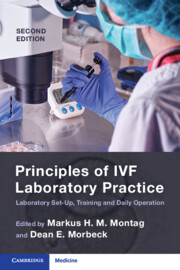Book contents
- Principles of IVF Laboratory Practice
- Principles of IVF Laboratory Practice
- Copyright page
- Contents
- Contributors
- Foreword
- The Evolution of IVF Practice
- Section 1 Starting a New Laboratory and Training Protocols
- Section 2 Pre-procedure Protocols
- Section 3 Gametes
- Section 4 Insemination/ICSI
- Section 5 Fertilization Assessment
- Section 6 Embryo Assessment: Morphology and Beyond
- Section 7 Embryo Cryopreservation
- Section 8 Embryo Transfer
- Section 9 Quality Management
- Chapter 40 Verification of Specimen Identity by Double Checking with a Witness
- Chapter 41 Quality Management in the IVF Laboratory
- Chapter 42 Troubleshooting in the IVF Laboratory
- Chapter 43 Disaster Preparedness in the IVF Laboratory
- Index
- References
Chapter 41 - Quality Management in the IVF Laboratory
Quality Improvement, Document and Process Control and Adverse Events
from Section 9 - Quality Management
Published online by Cambridge University Press: 07 August 2023
- Principles of IVF Laboratory Practice
- Principles of IVF Laboratory Practice
- Copyright page
- Contents
- Contributors
- Foreword
- The Evolution of IVF Practice
- Section 1 Starting a New Laboratory and Training Protocols
- Section 2 Pre-procedure Protocols
- Section 3 Gametes
- Section 4 Insemination/ICSI
- Section 5 Fertilization Assessment
- Section 6 Embryo Assessment: Morphology and Beyond
- Section 7 Embryo Cryopreservation
- Section 8 Embryo Transfer
- Section 9 Quality Management
- Chapter 40 Verification of Specimen Identity by Double Checking with a Witness
- Chapter 41 Quality Management in the IVF Laboratory
- Chapter 42 Troubleshooting in the IVF Laboratory
- Chapter 43 Disaster Preparedness in the IVF Laboratory
- Index
- References
Summary
Concurrently, IVF has become more complex due to the adoption of highly technological laboratory procedures, including cryopreservation of eggs and embryos, micromanipulation and pre-implantation genetic screening. In addition, the patient population being treated has broadened and often includes not only the intended parents but also gamete donors or gestational surrogates. It is critical therefore for IVF laboratories to implement and maintain the highest standards of quality. Quality can be an elusive concept and is often in the eye of the beholder. In an IVF laboratory it is frequently defined by a clinic’s success rates or the results of inspections by regulatory agencies such as the College of American Pathologists (CAP) or a laboratory’s ability to offer the latest technology. While these attributes are very important and a vital part of a high-quality laboratory, quality comprises many other elements that are often overlooked. This chapter has been written to guide laboratory directors and embryologists in this endeavour.
Information
- Type
- Chapter
- Information
- Principles of IVF Laboratory PracticeLaboratory Set-Up, Training and Daily Operation, pp. 301 - 311Publisher: Cambridge University PressPrint publication year: 2023
